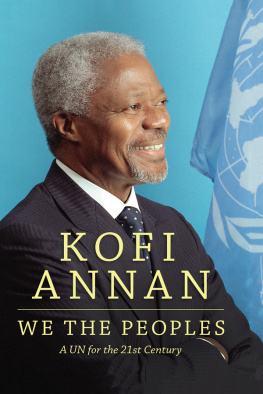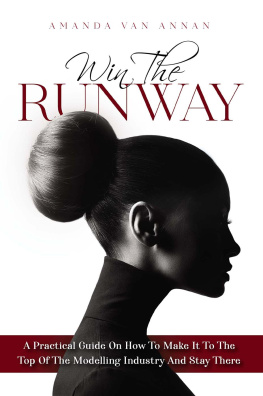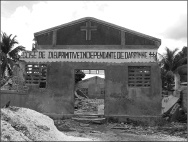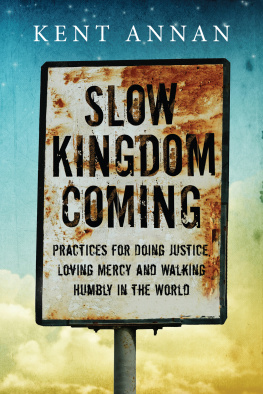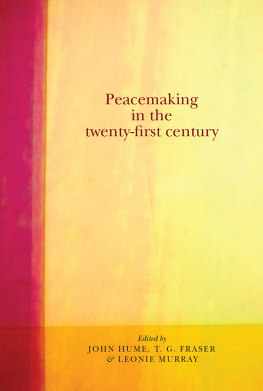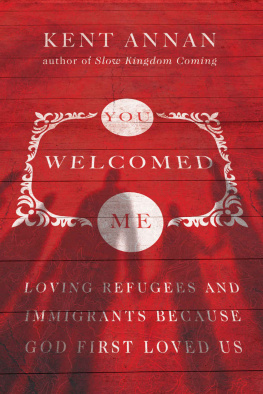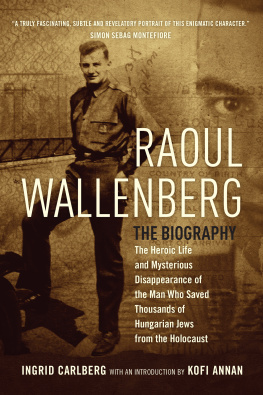First published 2014 by Paradigm Publishers
Published 2016 by Routledge
2 Park Square, Milton Park, Abingdon, Oxon OX14 4RN
711 Third Avenue, New York, NY 10017, USA
Routledge is an imprint of the Taylor & Francis Group, an informa business
Copyright 2014, Taylor & Francis.
A Girl Born Today in Afghanistan appearing in Chapter 1: Copyright The Nobel Foundation (2001). Source: Nobelprize.org. Reprinted with permission.
All rights reserved. No part of this book may be reprinted or reproduced or utilised in any form or by any electronic, mechanical, or other means, now known or hereafter invented, including photocopying and recording, or in any information storage or retrieval system, without permission in writing from the publishers.
Notice:
Product or corporate names may be trademarks or registered trademarks, and are used only for identification and explanation without intent to infringe.
Library of Congress Cataloging-in-Publication Data
Annan, Kofi A. (Kofi Atta)
We the peoples : a UN for the 21st century / Kofi Annan ; edited by Edward Mortimer.
pages cm
Includes index.
ISBN 978-1-61205-558-9 (hardcover : alk. paper)
ISBN 978-1-61205-652-4 (library ebook)
ISBN 978-1-61205-653-1 (consumer ebook)
1. Globalization. 2. United Nations. 3. Security, International. 4. Sustainable
development. I. Title.
JZ1318.A6652 2014
341.23dc23
2013043211
Designed and typeset by Straight Creek Bookmakers
ISBN 13: 978-1-61205-558-9 (hbk)
ISBN 13: 978-1-61205-559-6 (pbk)
Cover Design: Todd Lape / Lape Designs
Cover Image: UN Photo/Sergey Bermeniev
The Secretary-General of the United Nations is expected to play several different roles. The Charter defines him as the chief administrative officer of the Organization (Article 97) and requires him to make an annual report to the General Assembly (Article 98). But it also allows him to bring to the attention of the Security Council any matter which in his opinion may threaten the maintenance of international peace and security (Article 99)a clearly political responsibility. In practice, he is frequently called on to use his good offices to resolve or manage disputes through quiet diplomacy. Besides, the Member States often look to him for guidance on procedural matters, and sometimes for a lead on substantive ones, to help them find a common position.
But the Secretary-General is also a public figure who is expected to represent the UN, and its principles and ideals, to the world at large. This was anticipated by the Preparatory Commission of the United Nations in its report of 23 December 1945, just a few weeks before the first Secretary-General was appointed. The United Nations, said the Commission, cannot prosper, nor can its aims be realized, without the active and steadfast support of the peoples of the world . The Secretary-General, more than anyone else, will stand for the United Nations as a whole. In the eyes of the world, no less than in the eyes of his own staff, he must embody the principles and ideals of the Charter to which the Organization seeks to give effect.
In the early years of the Organization, this was a fairly small part of his job. Trygve Lie, the first Secretary-General, is remembered for having settled the United Nations in New Yorkhe persuaded John D. Rockefeller to donate the site on the East River and he assembled the outstanding team of architects who designed the buildingbut he is not recalled for any of his public statements. It was Dag Hammarskjld who first discovered that he could use his office as Theodore Roosevelt had used the US presidency, as a bully pulpit, from which to influence public opinion and thereby give himself some room to resist the pressure of powerful Member States. Hammarskjld made some very fine speeches, particularly the Oxford lecture on The International Civil Servant in Law and in Fact, to which I referred in my own Dag Hammarskjld lecture, the first item in this volume. But he had to choose his words and his themes with great care, navigating skillfully in the small space that the cold war allowed him. And after his death the three Secretaries-General who held office in the remaining decades of the cold war were similarly constrained.
By the time that I was appointed, at the end of 1996, the world had changed almost beyond recognition. The cold war had ended, with the result that the Security Council was no longer in a state of structural and permanent deadlock. Of course that did not mean that its members were able or willing to agree on an effective course of action in every case, as we quickly and painfully discovered in Somalia, in Rwanda, and in the former Yugoslavia. But it did mean that UN officials could speak up for some of the principles set out in the Charter and the Universal Declaration of Human Rights and sound as if they meant it, without automatically bringing down the wrath of one of the permanent members of the Council on their heads or causing a crisis that would paralyze the whole system.
And the world had changed in another respect, tooperhaps an even more important one. We had embarked on the communications revolution, which gave a whole new meaning to the phrase public figure. Any event, and any remark, could be instantly beamed around the world, and the person who in the eyes of the world stood for the United Nations was expected to react instantly. To say nothing was in itself considered a reaction and often was simply not an option. I found myself continuously in the media spotlight, whether I liked it or not.
This was a burden, but I soon realized that it was also an opportunity. I was well aware that I had no hard power: no armored divisions or bombers or battleships at my beck and call that I could deploy quickly in times of crisis. But I did have some soft power, in the phrase coined by Joseph Nye. The idea that there could be such a thing as world public opinion was no longer completely fanciful. People in different parts of the world were following the same events on their radios and TV sets, and increasingly on their cell phones or computer screens, in real time. They were becoming aware that certain issuessuch as endemic poverty, infectious disease, climate change, population growth, drugs, organized crime, migration, energy, and food supplieswere not confined within national borders and could not be dealt with by any one nation-state working alone. They saw the need for international cooperation, and they looked to the UNoften with very little knowledge or understanding of its history or its methodsas the body that should get nations working together for global solutions to global problems.
In other words, there was a global agenda and a global public. But someone needed to articulate that agenda and speak to that public. And it could not be just anyone. It had to be someone with a status that governments would recognize, someone with the authority to speak for humanity as a whole. Who could that be, if not the Secretary-General of the United Nations?
That may sound an absurdly ambitious thought, but I felt that I had little to lose by being ambitious. The times required it. And the time was propitious in another respect, too, which may seem trivial but which I believe was psychologically very important. I was appointed in 1996 for a five-year term, which therefore spanned the year 2000. On my watch, something was about to happen that everyone in the world would notice and that would not happen again for another thousand years: one millennium would end and a new one would begin. If ever there were a moment for the nations of the world to take stock of their situation collectively, to measure what they had achieved and to set themselves goals for the future, this was surely it. And it was only through the United Nations that such a collective stocktaking and goal-setting exercise could conceivably happen. Someone had to take the lead, and who else if not the Secretary-General?

